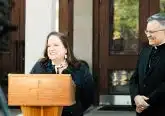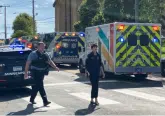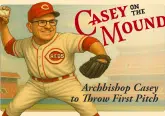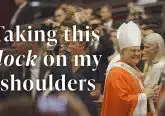Forum focuses on race in the church
February 4, 2011
By David Eck
DAYTON DEANERY — At a workshop several years ago, a nun commented to Father Bryan Massingale that because he was articulate and intelligent, a religious order must have educated him.
Father Massingale, who is African American, explained that his parents educated him and asked the nun if she would have made the comment to a white priest, inferring a perception that African Americans who are well-spoken must have been taught by white people.
 |
| Deacon Daniel Thomas of Our Lady of Sorrows Church in Monroe, shakes hands with Cincinnati Archbishop Dennis M. Schnurr at the forum’s closing mass. Father Len Wenke looks on. (CT/JEFF UNROE) |
The story was an example of the racism that exists in our culture and in the Catholic church, Father Massingale said during his Jan. 28 keynote address at the forum “All Are Welcome? Race in the Church Today.”
“Racism doesn’t need deliberate white sheets to express itself,” said Father Massingale, an associate professor of theology and associate director of undergraduate studies at Marquette University. “With the exception of discussions of human sexuality, perhaps no issue affects us viscerally more than the issue of race.”
Father Massingale, a priest of the Archdiocese of Milwaukee, holds a doctorate of sacred theology in systematics/ethics. He specializes in Roman Catholic moral theology with a focus on Catholic social thought, liberation theology, African-American religious action, racial reconciliation, environmental justice and terrorism and the challenge of peacemaking.
The forum, co-sponsored by the University of Dayton and the archdiocesan offices of African-American Catholic Ministries, Youth and Young Adult Ministry, Mission, Ecumenical and Interfaith Relations and Catholic Social Action, was held Jan. 28-29 at UD. Nearly 300 people attended the sold-out forum, including pastors, pastoral council members, school principals and parishioners.
During a 45-minute address, Father Massingale said that the church can help overcome the pain and division of race by performing the sacraments well, particularly baptism and the Eucharist.
Baptism makes us one in Christ, undermining and redefining the social significance of skin color, he said. The Eucharist illustrates how Jesus accepted all people at the table.
The power of ritual affects people in ways that go beyond intellectual instruction and cultural environment, Father Massingale said, noting that if Catholic rituals are done well, they teach people reverence for life and racial justice that can lead to healing deep wounds.
Still, if the church and society are to heal from the effects of racism, a look at the past is vital, he added.
“Confronting racism is difficult and challenging, yet essential for our faith,” Father Massingale said. “We haven’t had that as a church when it comes to looking at the sad legacy of exclusion that is really part our history. It’s a very painful thing, but it is our belief as Catholics that the painful acknowledgement of sin is the path to the healing power of grace.”
 |
| Deacon Royce Winters processes into the closing Mass. (CT/Jeff Unroe) |
Father Massingale shared observations about race in the United States and the diversity in the country, explaining that it is more racially and culturally diverse than it ever was. Census figures show that a third of the U.S. population is now Latino or non-white; almost half of the nation’s children under age five are racial or ethnic minorities, and in many urban centers people of color make up the majority of the population, but no single racial or ethnic group constitutes a numerical majority. By the middle of the 21st century, he said, it appears likely that white people will no longer be the majority race in the United States.
The traditional identity in both American society and in the Catholic Church is changing, giving some people pause, he explained.
“For many, this process of a new American identity that’s emerging is profoundly disorienting, a source of visceral fear and existential unease,” Father Massingale said. “Many, it seems, are experiencing culture shock.”
Discussing race in society and in the Catholic church is often marked by such emotions as unease, tension, anxiety, fear, anger and confusion. Some people, he said, fear they won’t be understood or heard, while others fear being blamed for racism. People may also feel defensive, embarrassed by the tragedy of racism or just weary from the years spent combating it.
“All of these are real. I share them every time I think about this, and these emotions are real for my students,” Father Massingale said. “Though we are all scarred in different ways and in varying degrees. no one living in the United States is immune from racism’s terrible damage. We are all wounded by the sin of racism.”
Father Thomas DiFolco, director of the archdiocesan Priestly Formation Office, said Father Massingale’s address challenged him to bring the experience of being one in Christ during baptism and the Eucharist to Catholics.
“We are all one in that prayer, in the faith, in the creed at the table,” Father DiFolco said. “It may not look like it, but that is our intention when we gather.”
 |
| Three Marianist novices from Mount St. John in Dayton sing during during the forum. From left, Hugo Bastida, Mike Chiuri and Norman Capinpin. (CT/Jeff Unroe) |
Tony Stieritz, director of the archdiocesan Catholic Social Action Office, has heard Father Massingale speak on the issue several times.
“He’s one of the preeminent theologians of the church on this topic,” Stieritz said. “He’s been a real prophet and voice for the church to try to dismantle any racist structures in our own church, as well as in society in general. It’s an ever-present task for all of us.”
Other speakers during the weekend included Gerald J. Beyer, an associate professor of Christian social ethics at St. Joseph University in Philadelphia, and C. Vanessa White, assistant professor of spirituality and the director of the Augustus Tolton Pastoral Ministry Program at the Catholic Theological Union in Chicago. Forum workshops addressed such topics as racial justice in the Catholic Church, the challenge of being a universal church and exploring the reality of race and place.
A Mass celebrated by Cincinnati Archbishop Dennis M. Schnurr concluded the forum.
David Eck can be reached at: [email protected].













